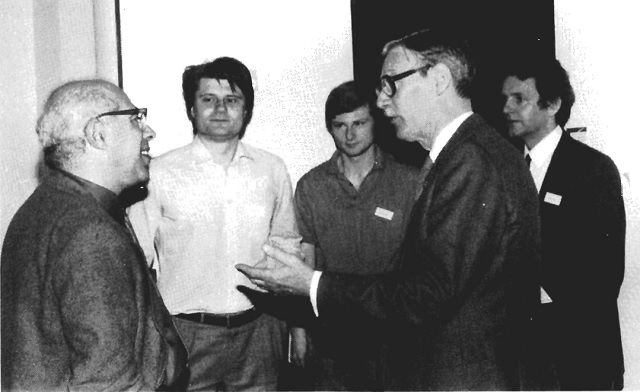Hermann Kaindl
Home * People * Hermann Kaindl

Hermann Kaindl,
an Austrian computer scientist, games researcher and since 2003 full professor at the Vienna University of Technology, where he already defended his Ph.D. under supervision of Wilhelm Barth [2] [3]. Kaindl was senior consultant with the division of program and systems engineering at Siemens AG Austria. Concurrently to his work in the industry, Kaindl has given lectures in computer science at the Technical University of Vienna since 1984, where he received the venia docendi in applied computer science (Praktische Informatik) in 1989 [4].
Contents
Merlin
As student, Hermann Kaindl was primary author of the chess program Merlin, along with Helmut Horacek, Marcus Wagner and Roland Schreier, competing at various ACM North American Computer Chess Championships and two World Computer Chess Championships in the 80s [5].
Photos
Advances in Computer Chess 5 Smalltalk:
Hans Berliner, Hermann Kaindl, Helmut Horacek, Adriaan de Groot and Reiner Seidel [6]
See also
Selected Publications
1978
- Hermann Kaindl, Werner Schimanovich (1978). Catrin - Mathematical 2-person-game. University of Vienna
1980 ...
- Hermann Kaindl (1981). Realisierung von langfristigem Planen und Massnahmen gegen den Horizont-Effekt im Computer-Schach. Doctoral Dissertation. Vienna University of Technology
- Hermann Kaindl (1982). Dynamic Control of the Quiescence Search in Computer Chess. Cybernetics and Systems Research (ed. R. Trappl), pp. 973-977. North-Holland, Amsterdam. » Quiescence Search
- Hermann Kaindl (1982). Positional Long-Range Planning in Computer Chess. Advances in Computer Chess 3, also published as Hermann Kaindl (1983). Positional Long-Range Planning in Computer Chess. Vienna University of Technology, Austria.
- Hermann Kaindl (1982). Quiescence Search in Computer Chess. SIGART Newsletter, 80, pp. 124-131. Reprinted (1983) in Computer-Game-Playing: Theory and Practice, pp. 39-52. Ellis Horwood Ltd., Chichester. » Quiescence Search
- Hermann Kaindl (1983). Searching to Variable Depth in Computer Chess. IJCAI 1983
- Hermann Kaindl (1985). What Happened with AI's Drosophila? ÖGAI 1985
- Hermann Kaindl, Helmut Horacek, Marcus Wagner (1986). Selective Search versus Brute Force. ICCA Journal, Vol. 9, No. 3
- Hermann Kaindl (1988). Minimaxing Theory and Practice. AI Magazine, Vol. 9, No. 3, pdf
- Hermann Kaindl (1988). Useful Statistics from Tournament Programs. ICCA Journal, Vol. 11, No. 4
- Hermann Kaindl, Marcus Wagner, Helmut Horacek (1988). Comparing Various Pruning Algorithms on Very Strongly Ordered Game Trees: The Details. Tech. Report #50, Department of Statistics and Computer Science, Vienna University of Technology, Austria.
- Hermann Kaindl, Marcus Wagner, Helmut Horacek (1989). Comparing Various Pruning Algorithms on Very Strongly Ordered Game Trees. Workshop on New Directions in Game-Tree Search
- Hermann Kaindl (1989). Towards a Theory of Knowledge. Advances in Computer Chess 5
- Hermann Kaindl, Anton Scheucher (1989). The Reason for the Benefits of Minmax Search. IJCAI 1989
1990 ...
- Hermann Kaindl (1990). Tree Searching Algorithms. Computers, Chess, and Cognition, pp. 133-158
- Hermann Kaindl, Reza Shams, Helmut Horacek (1991). Minimax Search Algorithms with and without Aspiration Windows. IEEE Transactions on Pattern Analysis and Machine Intelligence, Vol. 13, No. 12
- Reza Shams, Hermann Kaindl, Helmut Horacek (1991). Using Aspiration Windows for Minimax Algorithms. IJCAI 1991, pdf
- Gerhard Mehlsam, Hermann Kaindl, Wilhelm Barth (1991). Feature Construction during Tree Learning. GWAI 1991
- Hermann Kaindl, Anton Scheucher (1992). Reasons for the Effect of Bounded Look-Ahead Search. IEEE Transactions on Systems, Man, and Cybernetics, Vol. 22, No. 5
- Gerhard Mehlsam, Hermann Kaindl, Wilhelm Barth (1995). Feature Construction during Tree Learning. GOSLER Final Report 1995
- Hermann Kaindl, Gerhard Kainz, Angelika Leeb, Harald Smetana (1995). How to use limited memory in heuristic search. IJCAI 1995
- Anton Scheucher, Hermann Kaindl (1998). Benefits of Using Multivalued Functions for Minimaxing. Artificial Intelligence, Vol. 99, No. 2
2000 ...
- Johannes Fürnkranz, Bernhard Pfahringer, Hermann Kaindl, Stefan Kramer (2000). Learning to Use Operational Advice. ECAI-00, pdf
- Hermann Kaindl, Stefan Kramer (2006). Are Automated Traceability Checks Needed? ISOneWorld 2006
2010 ...
- Hermann Kaindl, Helmut Horacek, Anton Scheucher (2017). Product Propagation: A Back-up Rule Better than Minimaxing? IEEE Transactions on Computational Intelligence and AI in Games, Vol. 9, No. 2, pdf
- Hermann Kaindl (2018). Comment - Lookahead Search for Computer Chess. Communications of the ACM, Vol. 61, No. 12 » AlphaZero [9]
External Links
References
- ↑ Univ.Prof. Dipl.-Ing. Dr. Hermann Kaindl
- ↑ Hermann Kaindl (1981). Realisierung von langfristigem Planen und Massnahmen gegen den Horizont-Effekt im Computer-Schach. Doctoral Dissertation. Vienna University of Technology
- ↑ Werner DePauli-Schimanovich (2006). Europolis 6. Informatik für Spiele und Verkehr. Extension der Mengenlehre, Herausgeber: Franz Pichler, Universitätsverlag Rudolf Trauner, (SG7) Merlin (ein ComputerChess-Programm) s. 171 (German), Google Books
- ↑ Siemens AG Österreich
- ↑ Merlin's ICGA Tournaments
- ↑ Photo by László Lindner, ICCA Journal, Vol. 10, No. 3, pp. 117
- ↑ ICGA Reference Database
- ↑ dblp: Hermann Kaindl
- ↑ Comment concerning AlphaZero on Vinton G. Cerf (2018). On Neural Networks. Communications of the ACM, Vol. 61, No. 7
